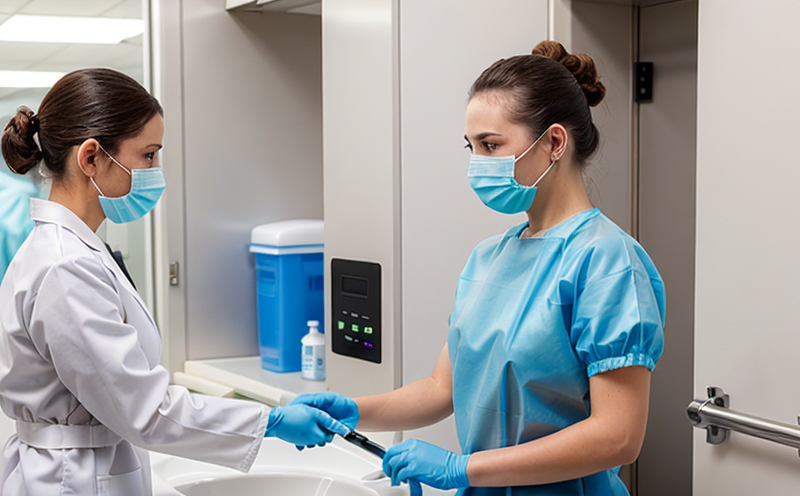EN 1884 Textiles Determination of microbial resistance of coated fabrics
The EN 1884 standard specifies a method for determining the microbial resistance of coated fabrics. This test is particularly important in sectors where hygiene and protection against microorganisms are critical, such as healthcare, medical devices, personal protective equipment (PPE), and home textiles.
Coated fabrics often incorporate antimicrobial agents to enhance their performance by inhibiting or killing microorganisms that may come into contact with the fabric. The EN 1884 test provides a standardized approach for quantifying this resistance, ensuring consistent results across different manufacturers and products.
The test involves exposing coated fabric specimens to specific microorganisms under controlled conditions. After incubation, the extent of microbial growth on the fabric is assessed visually or using microbiological techniques like colony-forming unit (CFU) counting. The difference in microbial load before and after exposure provides a measure of the antimicrobial effectiveness.
For accurate testing, specimens must be prepared according to the standard's specifications. This includes selecting appropriate sizes for testing, ensuring the fabric is representative of commercial products, and maintaining consistent environmental conditions throughout the test. The choice of microorganisms also plays a crucial role; common choices include bacteria like Saccharomyces cerevisiae (yeast) and Bacillus subtilis (gram-positive bacteria).
The test setup typically involves placing the fabric specimens in contact with the microorganisms in a controlled environment. This can be done using various configurations, such as flat plates or roll tests for continuous use applications. The duration of exposure and temperature conditions are strictly defined to ensure reproducibility.
Post-exposure assessment is critical for accurate determination. Microbial growth is quantified through visual inspection or by counting colonies on agar plates. The results provide a quantitative measure of the antimicrobial efficacy, which can be expressed as a reduction factor (RF) indicating the percentage decrease in microbial population.
The EN 1884 standard is widely recognized for its robust methodology and has been adopted globally to ensure consistent quality control in coated fabric products. It plays a pivotal role in safeguarding end-users against microbial contamination, particularly in high-risk environments like hospitals and laboratories.
In summary, the EN 1884 test offers a standardized procedure that enhances product reliability by quantifying antimicrobial resistance of coated fabrics. This ensures that consumers can trust products to provide effective hygiene protection, which is essential for maintaining health and safety standards in various sectors.
Applied Standards
The EN 1884 standard is part of a broader framework aimed at ensuring the quality and performance of coated fabrics used in hygiene applications. It complements other international standards such as ISO 20743, which focuses on antimicrobial activity in textiles, providing additional context for evaluating product performance.
In addition to EN 1884, industry-specific guidelines like ASTM E2659 and IEC 62477-2 also contribute to the overall assessment of coated fabrics. These standards address different aspects of textile hygiene, including surface treatment efficacy and material durability under hygienic conditions.
The combination of these standards ensures a comprehensive evaluation of coated fabrics, covering both antimicrobial performance and long-term stability. This holistic approach is crucial for maintaining high-quality standards in the medical, healthcare, and personal care industries where product integrity is paramount.
Eurolab Advantages
At Eurolab, we pride ourselves on delivering world-class textile testing services that meet the highest industry standards. Our expertise in EN 1884 and other related tests ensures that our clients receive accurate, reliable results every time.
We offer a range of services tailored to the specific needs of our clients, including:
- Comprehensive specimen preparation and handling
- In-depth analysis using advanced microbiological techniques
- Customized testing protocols for unique product requirements
- Expert interpretation of results to guide product development and compliance
Our state-of-the-art facilities are equipped with the latest instrumentation, ensuring that we can provide precise and reproducible test results. This commitment to quality is further reinforced by our team of experienced professionals who understand the nuances of textile hygiene testing.
We ensure that all tests are conducted in strict adherence to EN 1884 and other relevant standards, providing clients with confidence in their product's performance. Our services extend beyond basic testing; we offer strategic insights based on test results to help our clients improve their products and stay ahead of regulatory changes.
Quality and Reliability Assurance
At Eurolab, quality and reliability are non-negotiable. We employ rigorous quality control measures throughout the testing process to ensure that every result is accurate and reliable. Our commitment to excellence is reflected in our ISO 17025 accreditation, which validates our technical competence and adherence to international standards.
We use only the most advanced instrumentation and methodologies to conduct EN 1884 tests, ensuring that our results are not only precise but also consistent across multiple samples. Our team of experts is continuously trained on the latest testing techniques and industry developments to stay ahead of changing requirements.
In addition to technical expertise, we offer comprehensive reporting services that provide clients with detailed insights into their product's performance. This includes graphical representations of test data, statistical analysis, and recommendations for improvement based on our findings.
Our quality assurance processes are designed to minimize errors and ensure that every test is conducted in a controlled environment. By adhering strictly to the EN 1884 standard and other relevant guidelines, we guarantee that clients receive reliable results that can be trusted for compliance purposes.





